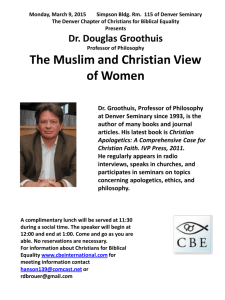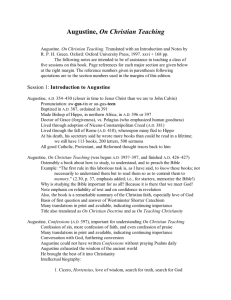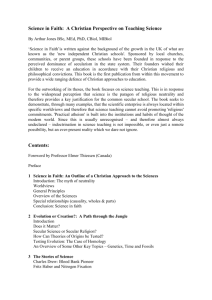Paper about Augustine
advertisement
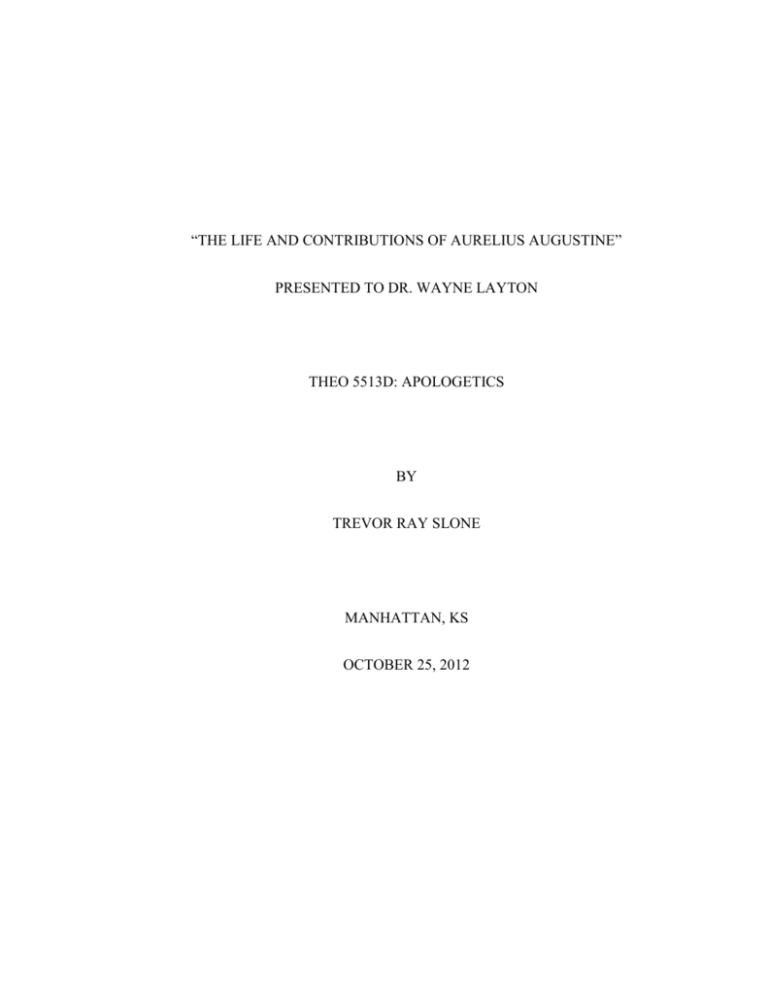
“THE LIFE AND CONTRIBUTIONS OF AURELIUS AUGUSTINE” PRESENTED TO DR. WAYNE LAYTON THEO 5513D: APOLOGETICS BY TREVOR RAY SLONE MANHATTAN, KS OCTOBER 25, 2012 There is one man in the history of Christian thought, besides Jesus and the Apostle Paul, that stands out more than all the others, whether they be theologians, philosophers, monks, popes, kings, or whatever else they may have been. That man’s name is Aurelius Augustine.1 Augustine was both a philosopher and a theologian, and the impact that he made on the Christian tradition has been felt throughout the centuries since his birth and can still be felt quite noticeably even today in the twenty-first century. In this paper there will first be a cursory discussion regarding the life of Aurelius Augustine. After that this paper will move on to the area of Augustine’s major theological and apologetic contributions to the Christian faith, and more particularly his view on the correlation between faith and reason, and then this paper will end with some brief closing remarks. Aurelius Augustine Aurelius Augustine, known by many as Saint Augustine, Augustine of Hippo, or simply Augustine, “was born in Thagaste, Numidia, in North Africa (roughly modern Algeria) on November 13, 354.”2 His father, Patricius, was a pagan and an official of the Romans curia, and his mother, Monica, was a devout Christian who prayed earnestly for Augustine for many years.3 At age twelve Augustine’s parents sent him to a school where he adopted a pagan lifestyle, and at age sixteen he went to Carthage and studied rhetoric, Latin classics, and Greek philosophy, of which Plato’s Idealism “impressed him.”4 1 Erwin Lutzer, Doctrines that Divide: A Fresh Look at the Historic Doctrines That Separate Christians (Grand Rapids: Kregel Publications, 1998), 157. 2 Gannon Murphy, Voices of Reason in Christian History (Camp Hill: Christian Publications, Inc., 2005), 84. 3 Ibid. 4 H. Lynn Gardner, Commending & Defending Christian Faith: An Introduction to Christian Apologetics (Joplin: College Press, 2010), 317-318. Eventually Augustine “made his spiritual pilgrimage from Greek paganism through Manichean dualism to neoplatonism and finally to Christian theism.”5 His education and incredible genius became idols to him in his early years. 6 He also had a son, Adeodatus, out of wedlock.7 His time following the Manichean religion eventually became of great use to him in his later days as a Christian; for he sought to thoroughly refute the teachings of Mani (the leader of the Manicheans) from an apologetic standpoint. Augustine “partly owed his conversion to reading Athanasius’ Life of Saint Anthony, and lived as a monk until he was forced to take a more active role in the church,”8 which was, more specifically, his ordination as Bishop of Hippo in A.D. 396.9 He held this particular bishopric for thirty-four years, during which time he wrote works on a wide variety of subjects, including “doxological, theological, axiological, exegetical and apologetical” issues.10 Augustine has been criticized for a lot of things throughout the centuries, but probably the biggest complaint people have against him is his infatuation with platonic and neoplatonic thought. It could also be claimed that he accepted these ideologies on a very uncritical level for most of his life.11 Nevertheless, overall Augustine made many significant contributions to the world of Christian thought, not least of which were his books Confessions and The City of God, to which this paper will now turn to briefly examine, along with some of his other writings and teachings. 5 Norman L. Geisler, Baker Encyclopedia of Christian Apologetics (Grand Rapids: Baker Academic, 1999), 60. Murphy, Voices of Reason, 85. 7 Ibid. 8 Justo L. Gonzalez, The Story of Christianity: Vol 1, The Early Church to the Dawn of the Reformation (New York: Harper One, 2010), 169. 99 Murphy, Voices of Reason, 92. 10 Ibid. 11 Geisler, Baker Encyclopedia of Christian Apologetics, 62. 6 A Brief Look at Some of Augustine’s Contributions to Christian Thought As was stated above, Augustine has contributed a great deal to the world of Christian theology and apologetics. To be sure much of what he wrote and taught could almost be deemed heretical, most especially his particular method of interpreting the Scriptures, namely on a most heinously allegorical level. It must be noted in passing though that ultimately his theological views were extremely orthodox, and considering that this type of hermeneutic was something that most biblical exegetes did in those days it can certainly be seen why this was and still often is overlooked when considering and discussing his influence on Christian history and thought. Ultimately, regardless of his allegorical method of interpretation and his often heavily platonic bent, he nevertheless was a mighty man of God who should rightfully be considered one of the greatest Christian thinkers of all time, and most especially of the first millennium A.D. One of Augustine’s most famous works is his Confessions, in which he deliberates his life prior to becoming a Christian12 and also more specifically his conversion to Christianity. He reminisces in this work about when he came to Carthage, and that he was immediately surrounded by unholy things.13 He also goes into a bit of detail regarding his obsession with sexuality and lust.14 The reason that this part of this work of Augustine’s should be counted as being significant to the Christian faith is that it shows that even the greatest of Christians struggle with the wiles of the sinful life, most notably prior to becoming a Christian. This is important to the apologetic arena in that it can establish to the non-Christian that one does not have to be 12 This work also included various apologetic arguments within it. Augustine, Confessions, 3.1.1. Cited in Gannon Murphy, Voices of Reason, 84. 14 Ibid. 13 perfect to become a Christian, for apologetics is ultimately and fundamentally a sub-discipline of evangelism, something that many modern apologists tend to forget or overlook. Also, Augustine, in his work On the Canon makes the point that it is vitally important for Christians to study the Word of God. For instance, he says in chapter 9, “…those matters that are plainly laid down in them [the Scriptures], whether rules of life or rules of faith, are to be searched into more carefully and more diligently; and the more a man discovers, the more capacious does his understanding become.”15 This is important for apologetics in that the Scriptures contain, and even to some extent are, the basis for a proper Christian apologetic, for although one may not start their particular apologetic method with presupposing that Scripture is true, that supposition is nevertheless a necessary, although not sufficient, supposition that one must possess and embrace if he is to be a true Christian in the first place, and one cannot be a true Christian apologist if he is not first and foremost a true Christian. So all those who wish to partake in the task of Christian apologetics must necessarily know what the Scriptures say that they are attempting to defend, for to suppose that something is true without even knowing the cognitive content of the thing is irrational and meaningless, as one cannot make a rational judgment regarding the truth or falsity of a propositional claim, such as those made in the Scriptures, without first knowing and understanding the true substance of such claims. Next, in his work entitled The City of God Augustine compares and contrasts two cities, namely the city of man, which is an analogy for the sinful, unregenerate people of the world, past, present, and future, and the city of God, which is an analogy for the Christians of the world, past, present, and future. One of the most important points that Augustine makes in this book can 15 Augustine, “On The Canon,” in Christian Apologetics: An Anthology of Primary Sources, Khaldoun A. Sweis and Chad V. Meister, eds. (Grand Rapids: Zondervan, 2012), 273-276. be found in book 1, chapter 35. He says, “…let this city [the city of God] bear in mind, that among her enemies lie those hid who are destined to be fellow-citizens, that she may not think it fruitless labor to bear what they inflict as enemies until they become confessors of the faith.”16 This passage here shows very clearly that Christians need to be careful in how they live in this world (the city of men) because Christians never know which of the people that they come into contact with may someday come to know Christ as their Lord and so become members of the body of Christ (citizens of the city of God). This is important to the apologetic task in that it should remind all who practice the discipline of apologetics that they should be careful as to how they interact with nonbelievers, for they do not want to set a bad example and turn those nonbelievers off to the faith. More pointedly though this statement by Augustine points out that when Christians are persecuted by nonbelievers they should embrace such persecution gracefully, knowing that it may eventually lead to the conversion of such persecutors. Finally, Augustine, following the tradition of Plato but also expounding on it further in relation to the Christian God (as the One in Platonic thought), brought about the idea “that Christians understand that the good, the beautiful, the true, and the real, are indeed one,” because all of these four things are established in the reality of God.17 This idea essentially argues that the good, the beautiful, the true, and the real are all necessarily tied to each other due to the fact that they all stem from the very essence of God. Hence, if something is not any one of these four things, namely good, beautiful, true, or real, then it is necessarily not any of these things. Also, if something is one of these things then it is necessarily all four of these things. In other words 16 Augustine, “The City of God,” in Christian Apologetics: An Anthology of Primary Sources, Khaldoun A. Sweis and Chad V. Meister, eds. (Grand Rapids: Zondervan, 2012), 513-518. 17 R. Albert Mohler Jr., The Disappearance of God: Dangerous Beliefs in the New Spiritual Openness (Colorado Springs: Multnomah Books, 2009), 50. something cannot be true and good but not real and beautiful, or real but not true, good, and beautiful. However, it would seem that this idea presented by Augustine falls short of being acceptable, for it would require that some things that are objectively immoral be considered good and beautiful, such as someone being raped, for if someone is raped then that event was real but it cannot rightfully be called good or beautiful. But when we consider that this idea only applies to things that can legitimately fit into, or be considered as relating to all of these four categories the problem is seemingly resolved, for although the event of someone being raped may be real and yet not good, an event is not something that can be considered as true or false, and so it cannot be considered as something that Augustine’s above assertion is referring to. Yet, since there doesn’t seem to be anything that legitimately fits into, or that can rightfully and rationally be said to relate to, all four of these categories, namely true, good, real, and beautiful, then Augustine’s assertion seems to be useless if one is not talking specifically about God, for the only types of “things” are: propositions/statements/questions/commands….., which cannot be considered to be beautiful in and of themselves; events, which cannot in and of themselves be considered true or false, for they either happened or they did not, but that is not the same thing as being true or false; persons/creatures (which would technically include plant life and all living things), which cannot rightfully be classified as true or false; ideas/concepts, which, when distinguished from propositions, also cannot be legitimately classified as true or false; and inanimate objects (which would include water, paintings, dirt, sculptures….), which again cannot appropriately and rationally be classified as true or false. Those seem to be the only types of “things” that there are, namely propositions/statements/questions/commands….., events, persons/creatures, ideas/concepts, and inanimate objects; and since none of them can rightfully be said to even be considered as fitting into or relating to all four categories, namely good, true, beautiful, and real, or in other words it would be meaningless and irrational to consider placing each of these five “things” into at least one of these four categories, then Augustine’s assertion that the if something fits into one of these categories then it necessarily fits into all four of these categories is meaningless unless the object of such an assertion is God Himself. Hence, this particular contribution to Christian thought by Augustine, while an astute notation regarding God, is essentially only that and nothing more. Augustine’s View Regarding Faith and Reason To put it ever so concisely, Augustine believed that reason precedes faith and also that faith precedes reason.18 In other words, Augustine was aware that for something to be believed (i.e. for someone to have faith in something19), it must first be known of and understood by the one who is to believe it. For instance, if one was asked to believe that “the White House is white,” they must first understand what the words in that proposition mean (White House, white, the, is), have an idea of what the proposition “the White House is white” is attempting to convey ideologically, and there must be some type of referent in their mind, whether actual or fictitious, that both the words in the sentence and the concept as a whole that the proposition is attempting to express are linked to, otherwise it would be impossible for that person to actually believe the proposition that the White House is white. However, Augustine was also keenly aware of the fact that as far as the Christian religion and the propositional truth in the Bible are concerned, faith necessarily precedes reason, 18 Kenneth D. Boa and Robert M. Bowman Jr., Faith Has Its Reasons :Integrative Approaches to Defending the Christian Faith (Colorado Springs: Biblica Publishing, 2005), 16. 19 This is not an attempt to argue that faith and belief are the same thing, but for the purposes of this discussion it seems best to keep it simple and just equate the two, since to a large extent they are indeed the same thing. for one cannot come to faith in Christ by reason alone, but he must first have his mindset altered by the Holy Spirit through the power of regeneration.20 So, while people must understand on a basic level what propositions are being presented to them regarding the Christian religion, and while they may even fully intellectually ascent to the truths of those propositions, they nevertheless are completely incapable, apart from the work of the Holy Spirit, of accepting such truths in a way that would alter their way of thinking and living, especially to the extent that they would begin to love Christ above all and live a Christian life simply because it pleases God, which is one of the fundamental principles of the Christian faith.21 Conclusion In Conclusion, there has been, in this paper, a brief discussion of the life of Aurelius Augustine. In this paper there was also a talk about some of the contributions that Augustine made to the realm of Christian theology and apologetics. Finally, there was a brief discussion about Augustine’s view of the relationship between faith and reason. It can be seen from this quick look at the life and work of Augustine that he was a great man of thought who contributed immensely to the Christian tradition and faith. Bibliography Augustine. Confessions. 3.1.1. Cited in Gannon Murphy. Voices of Reason in Christian History. Camp Hill: Christian Publications, Inc., 2005. 20 This is not the place to get into an argument about the logical succession and progression of steps regarding a person attaining salvation, but it is being argued here that regeneration logically precedes faith. 21 This is so even though many people ignore this principle these days, especially when they are attempting o evangelize. Augustine. “On The Canon.” in Christian Apologetics: An Anthology of Primary Sources. Khaldoun A. Sweis and Chad V. Meister, eds. Grand Rapids: Zondervan, 2012. Augustine. “The City of God.” in Christian Apologetics: An Anthology of Primary Sources. Khaldoun A. Sweis and Chad V. Meister, eds. Grand Rapids: Zondervan, 2012. Boa, Kenneth D., and Robert M. Bowman Jr. Faith Has Its Reasons :Integrative Approaches to Defending the Christian Faith. Colorado Springs: Biblica Publishing, 2005. Gardner, H. Lynn. Commending & Defending Christian Faith: An Introduction to Christian Apologetics. Joplin: College Press, 2010. Geisler, Norman L. Baker Encyclopedia of Christian Apologetics. Grand Rapids: Baker Academic, 1999. Gonzalez, Justo L. The Story of Christianity: Vol 1, The Early Church to the Dawn of the Reformation. New York: Harper One, 2010. Lutzer, Erwin. Doctrines that Divide: A Fresh Look at the Historic Doctrines That Separate Christians. Grand Rapids: Kregel Publications, 1998. Mohler Jr., R. Albert. The Disappearance of God: Dangerous Beliefs in the New Spiritual Openness. Colorado Springs: Multnomah Books, 2009. Murphy, Gannon. Voices of Reason in Christian History. Camp Hill: Christian Publications, Inc., 2005.

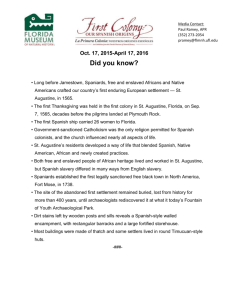
![Medieval Europe [1000-1500]:](http://s3.studylib.net/store/data/007874335_2-d7638f4faf65156dfdcac29a09a00993-300x300.png)

